Fill your flower garden with colorful, nectar-rich plants that will attract butterflies and hummingbirds from summer into fall.
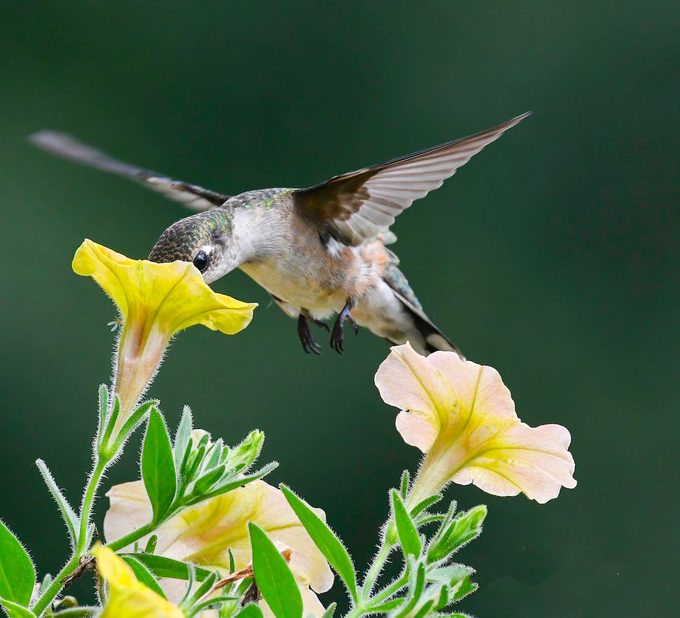
16 Long-Blooming Plants to Attract Hummingbirds and Butterflies

It’s important to keep flowers blooming as long as possible to help butterflies and hummingbirds later in the season. With thousands of monarchs and hummingbirds migrating south for the winter, these amazing fliers still need good nectar sources to fuel their journeys. To make it easier to choose the right plants, we put together this “Sweet 16” list of blooms to grow in your yard. We chose them because they are some of the hardiest plants you can find and they also happen to be gorgeous. Enjoy the late-season flower color on these plants that attract hummingbirds and butterflies galore!
On This Page
Joe Pye Weed

Eupatorium purpureum, Zones 3 to 9
This tall perennial (grows up to 7 feet) definitely deserves a spot in your flower bed. Joe Pye weed has large medium-pink blooms and interesting foot-long, whorled leaves. As a bonus, the flowers smell like vanilla; it’s no wonder they’re great at attracting butterflies!
Check out more fragrant flowers that pollinators love.

Russian Sage
Perovskia, Zones 4 to 9
Big and showy, the purple blooms of Russian sage are butterfly magnets. Plant just one of these perennials in your garden, and you’ll see a difference in a single season. With its silvery foliage and bursts of small purple blooms, it’s a great accessory anywhere.
Discover the top 10 purple flowers that attract hummingbirds.

Black-Eyed Susan
Rudbeckia, Zones 3 to 9
Hummingbirds and butterflies nectaring on black-eyed Susan flowers start the wildlife parade followed by seed-eating birds. It’s common to see butterflies at these yellow, orange and russet blooms (like the white peacock butterfly featured in this photo). As a bonus, these are some of the most drought-tolerant blooms you can find.
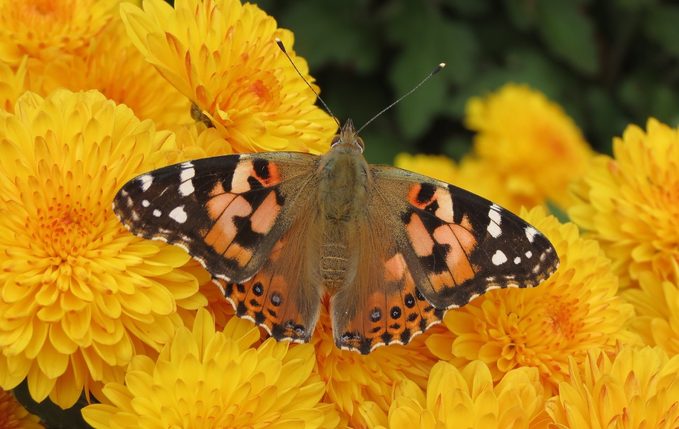
Chrysanthemum
Chrysanthemum, Zones 5 to 8 or Annual
When it comes to great fall flowers, the list wouldn’t be complete without chrysanthemums. Whether you start with bare-root mums in spring or buy container-grown plants in late summer, these stunners are a great nectar source. They’re one of the last blooms in the garden attracting butterflies in the fall.

Bee Balm
Monarda didyma, Zones 4 to 9
Hummingbirds love the tubular blooms of this bright red flower, which grows up to 4 feet tall. Many think of bee balm as predominantly a summer plant, but it also offers a great nectar source through early fall, too.
These are the top red flowers that attract hummingbirds.
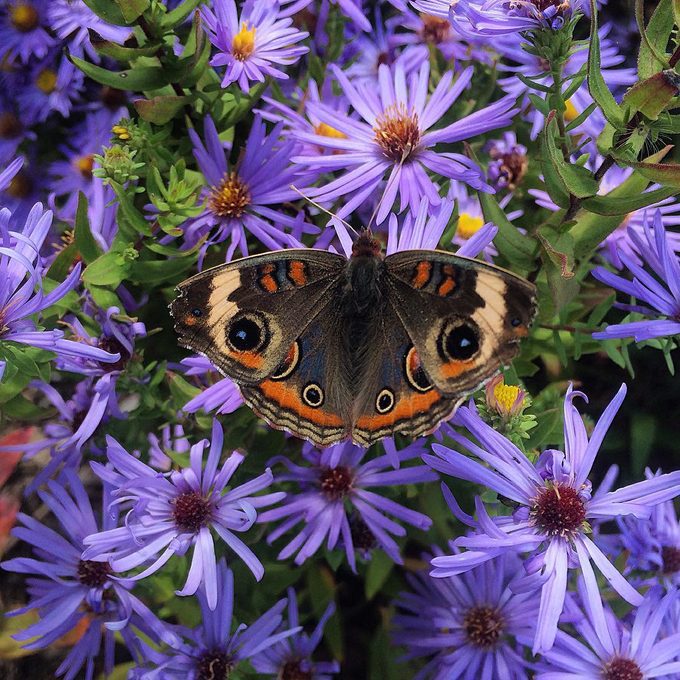
Aster
Aster, Zones 3 to 9
Growing up to 6 feet tall (dwarf varieties are shorter), asters sport dozens of blooms on a single plant. If you plant early in the season, they’ll have plenty of time to get established for winter. Or try your luck by picking up some end-of-season deals. You’ll be glad you did.
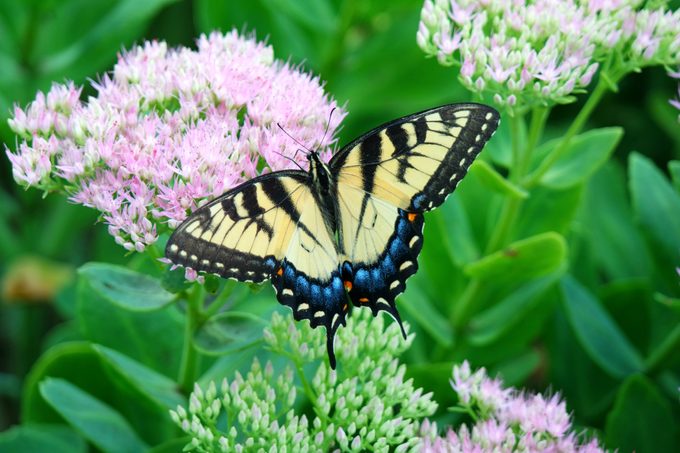
Sedum
Sedum, Zones 3 to 8
Fall is the peak time for this backyard favorite, which grows up to 2 feet high and is a popular choice for attracting butterflies. The star-shaped blooms on Autumn Joy start out pale green and then become a rich burgundy color as the leaves change and finally turn a rust color after frost.

Coreopsis
Coreopsis spp., Zones 3 to 11
This two-for-one bloom attracts both seed-eating birds and butterflies. Skippers, buckeyes, painted ladies and monarchs often stop by for the plant’s sweet nectar, especially in late summer when coreopsis is growing strong while other blooms are wilting away.
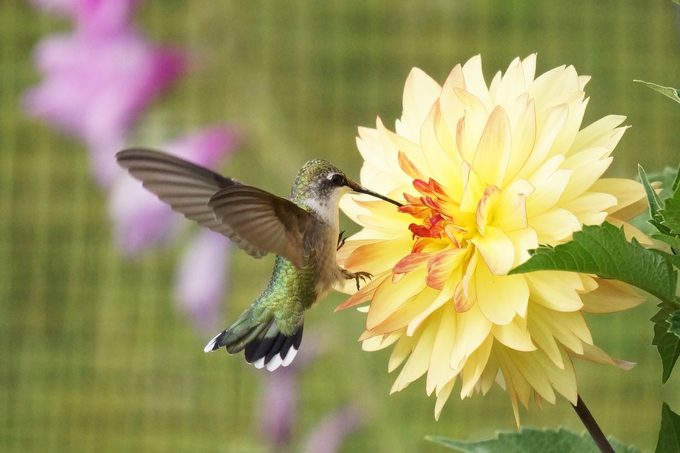
Dahlia
Dahlia, Zones 9 to 11 or Annual
Big and beautiful, a dahlia is a shining star in the garden. Though in most regions gardeners have to dig up the tubers in late fall and replant in spring, the effort is well worth it. The end result is huge blooms (some as big as 10 inches) that are excellent for attracting hummingbirds and butterflies.

Cosmos
Cosmos bipinnatus, Annual
You can find this beauty in shades of pink, white, red and purple, growing as high as 6 feet tall. Cosmos lasts well into fall and is like a bright beacon to hummingbirds and butterflies passing through on their migrations.

Purple Coneflower
Echinacea purpurea, Zones 3 to 9
Birds, bees and butterflies all love native perennial coneflowers. While birds will pause to snack on drying coneflower seed heads, butterflies and hummingbirds will stop for its nectar in fall.

Goldenrod
Solidago spp., Zones 3 to 9
This is a plant for which a little deadheading goes a long way. Be sure to give goldenrod plenty of room to spread. They grow up to 48 inches high and 30 inches wide, with a beautiful golden shade.

Zinnia
Zinnia, Annual
Another surefire annual, this beauty is guaranteed to extend the season until the first frost. If you’re looking for variety, zinnias are the perfect flower for you. You can find bloom shapes in daisy- or dahlia-like configurations and in just about any color. Nearly all are excellent plants that attract hummingbirds and butterflies. And zinnias are easy to grow from seed.
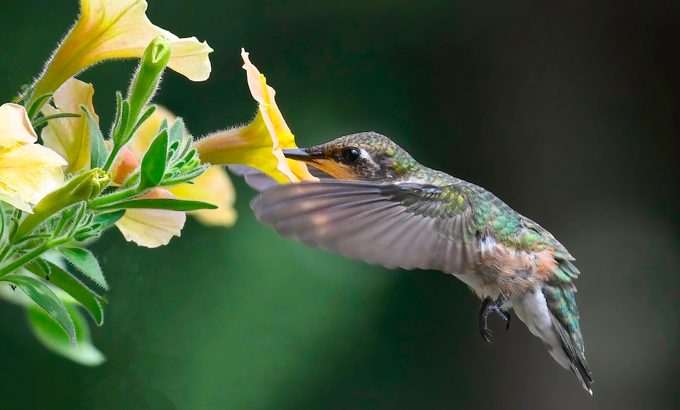
Petunia
Petunia x hybrida, Annual
Get your pinchers ready—deadheading petunia blooms will keep them going all the way until frost in beautiful shades of pink, red, pale yellow, violet-blue, white and various combinations. A favorite for hanging baskets, petunias attract hummingbirds in late summer and early fall.
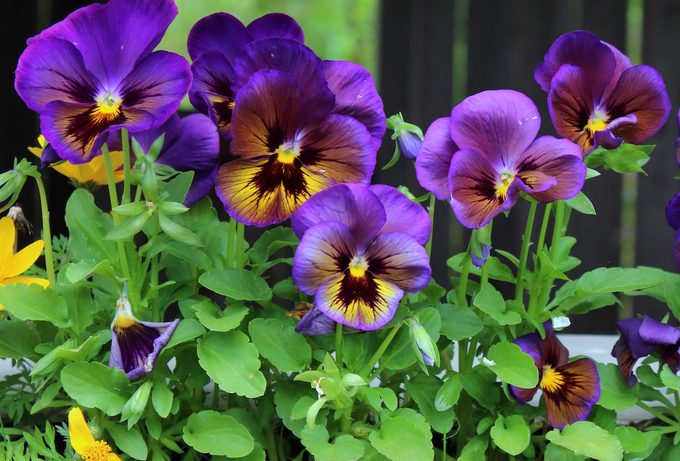
Pansy
Viola x wittrockiana, perennial in Zones 8 to 11 or Annual
If you live in a cooler climate, pansies are perfect for you. Many cultivars are specifically developed to survive spring and autumn temperatures. Some even work as hardy winter annuals.
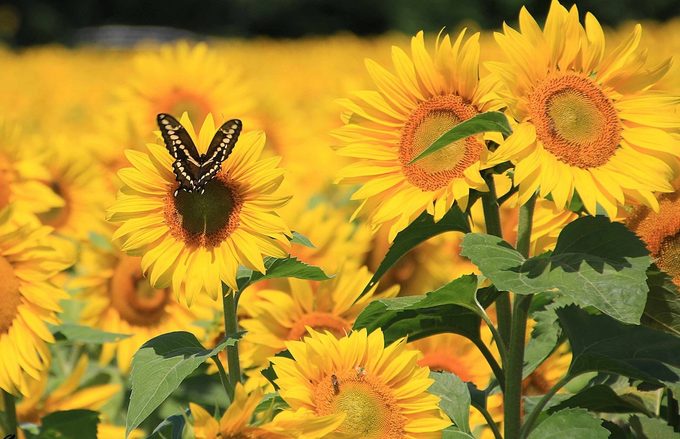
Sunflower
Helianthus annuus, Annual
Summer wouldn’t be complete without giant stalks of sunflowers. They are a favorite among seed-eaters, but since they last into early autumn, they’re a great nectar source as well. Though the classic sunflower is yellow, you can now find varieties in red, brown and more. Gardeners are often surprised to find sunflowers are plants that attract hummingbirds and butterflies as well as songbirds.





















